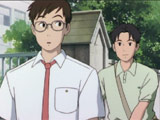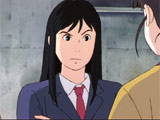

Quick Links:
Ocean Waves (Umi ga Kikoeru)
Ocean Waves (the Japanese title is Umi ga Kikoeru, literally meaning "I can hear the sea") is a short, made-for-TV movie that aired in 1993. It's the story of two male high-school friends and their experiences with an exceptionally moody female transfer student. Though its length of only 72 minutes proves to cause a bit of deficiency in storytelling, the film nevertheless retains that signature Ghibli magic. The film stresses being honest with your feelings, through its sentimental flashback on high school life.
The plot of Ocean Waves is perfectly ordinary. The movie is set primarily in the city of Kochi, with some scenes in Hawaii and Tokyo. At the beginning of their high school experience, Taku Morisaki and Yutaka Matsuno are still bummed about the cancellation of their junior-high trip to Kyoto (even though a trip to Hawaii was offered as a compromise for when they reach high school). Yutaka calls Taku out to school from work because the two haven't seen each other for a while, and there they meet Rikako Muto for the first time. She had just transferred in from Tokyo, and Yutaka appears to have taken an interest in her. Though it becomes quickly apparent that she is a gifted student and athlete, she doesn't speak to anyone much until the trip to Hawaii.
While in Hawaii, she makes a request out of the blue to Taku. She asks him to borrow some money, and the trouble starts there. The rest of the film deals with their strange relationship (most of which involves bickering of an almost marital nature), as well as her family problems. Yutaka appears periodically as her only other friend. You could say the three are a love triangle, in a warped sense of the term. After all, the two males are good friends the whole time, and the girl more or less dislikes them both.
On that note, you might find it a tad difficult to like Rikako. She comes across as an extremely self-centered, manipulative brat. Being someone who has displayed an equally rotten personality at times, I found her demeanor oddly appealing. Taku and Yutaka do as well, for their own reasons. The dynamics of this triangle relationship are what drive the film. And although Yutaka and Taku are the more 'likeable' per se, they both have some growing up to do over the course of the movie as well.
The film relies on nested flashbacks to tell most of the story. Even though most of the movie takes place in their second year of high school, the present time is actually a year after their high school graduation, when a reunion is to take place in Kochi. This kind of structure for the plot works pretty well, but the pacing is suggestive of a two hour movie, not 72 minutes. As a result, the ending leaves me thinking that there should have been more - if only a few minutes of dialogue to wrap things up. Despite this slight lack of completeness, the story is charming and interesting throughout.
Ocean Waves was made for television on a low budget, and it shows. While the backgrounds are still gorgeous (this is typical for Ghibli movies), the characters don't blend in very well. The animation is nothing special, but is rather good for what they had to work with. The character designs are also fairly simple, yet elegant. The voice actors for Yutaka, Taku, and Rikako (Toshihiko Seki, Nobuo Tobita, and Yoko Sakamoto, respectively) are primarily responsible for the charm of the story. Sakamoto even sings the ending theme to the movie, titled Umi ni Naretara (meaning If I Experience the Sea...) - a pleasant tune about gaining courage and peace of mind. The music was composed by Shigeru Nagata, whose influence also appears in Here is Greenwood among other titles. The film's music is decent overall, but stands out too much in a few places where digital instruments are used.
Though it has more faults than your typical studio Ghibli movie, Ocean Waves is still well worth the price of admission. The film is pretty safe for family viewing, though parents should be aware that there is a scene where a boy strikes a girl. In summary, the film is a pleasant, nostalgic view of high-school friendships and romance. It has terrific characterization, and a sugary-sweet Sleepless in Seattle style ending. Don't miss it!
Distributor: Disney (Region 2 DVD) Creator: Saeko Himuro / Studio Ghibli Released: 1993
Plot: A- Character Design: B Animation Quality: B- Music: B Overall: B+



